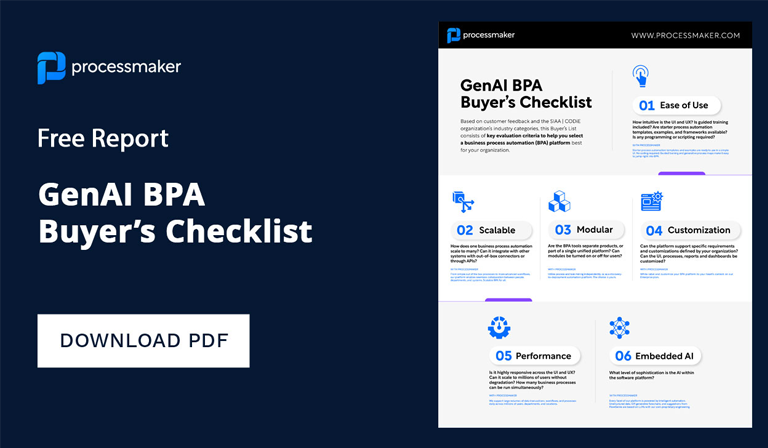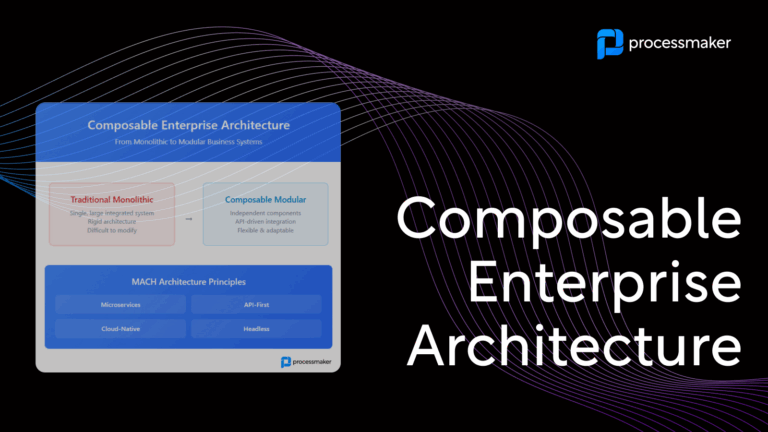What does case management mean? It depends on your organization and job role. For instance, lawyers manage client cases consistently, and doctors handle patient cases. Further, help desk problem tickets are also typically called “cases.” In addition, drug manufacturers must manage compliance cases effectively. A “case” might describe data, a physical object, or a human. “Case management” describes the workflows, business processes, events, and milestones needed to decide on each “case.”
In many organizations, the case management process is slow, time-consuming, redundant, and error-prone. It could benefit from automation to improve decision-making turnaround time, employee productivity, the end-user experience, and overall accuracy. This is where you can apply BPM software for case management knowledge work. Keep reading to learn more.
Case management trends
Within the context of Industry 4.0, many organizations are continuing to ramp up their digital transformation initiatives. As a result, technological advancements in the workplace also impact the case management process. BPM software plays a primary role in transforming end-to-end case management processes and will continue to do so.
Organizations can no longer afford to manage their cases in silos. In the digital era, trends point to case managers taking a novel look at overhauling outdated processes, which are typically too reliant on internal or departmental workflows. BPM software can help to tear down the silos to ensure effective collaboration and case management processes.
Another case management trend is to focus on the customer experience. Every organization has a customer, whether it is another business, a consumer, a client, a patient, or something else. Unquestionably, customers have high expectations concerning how they want to interact with businesses and how much patience they have for case remediation.
In addition, they have an extremely low tolerance for unexpected delays. Therefore, improving the customer experience can depend on automating case management processes with a BPM platform.
Unify case management systems
The demand for transparency, real-time data, more control, and increased visibility around business processes is at an all-time high. How can your business meet these demands? By using BPM software to unify your case management data with your systems and applications. Hence, BPM can become a critical component of case management when deployed to manage unpredictable, time-consuming, and error-prone processes.
It’s vital to use BPM to support highly dynamic case management processes. However, it’s just as essential for your BPM platform to support these case management principles:
- Contextual — End-users can access cases based on the context of the work.
- Relevant — Cases are accessed by relevant stakeholders/decision-makers.
- Alignment — Case management processes should map to the proper workflows, people, and systems for better control.
How can you tell you need BPM software for case management?
There are many ways you can tell your company needs BPM software for case management, including the following:
- You are overwhelmed with paper spreadsheets and notepads.
- You don’t have enough control or visibility across cases.
- You need to access two or more systems to find the correct data.
- There are too many silos.
- Your neck hurts from swiveling around between screens.
- Your spreadsheets are starting to resemble gibberish.
- You rely on clipboards to document cases.
- It can take hours or even days to navigate through documents and emails.
- Collaborating with other stakeholders requires in-person meetings.
- You spend too much time finding the right answers.
- You’re still stuck on pivot tables.
If any of these scenarios describe your case management processes, then it’s time to evaluate BPM platforms.
Four types of case management processes
Depending on your industry, there are different applications for case management processes and examples. Here are the four categories:
- Process to Decision — Require heavy structure and rules such as cases involving patient care in medical facilities.
- Service requests — Making decisions based on claims such as Insurance.
- Incident management — Resolving cases in adverse environments such as hazardous waste management or emergency response where you have to engage with workers in the field.
- Investigations — Managing cases around compliance, employment, financial, or other forms of regulations.
Look for these features in your case management BPM software
The right platform can manage any variety of casework, such as dynamic processes for complicated decision-making. Using event management, processes capabilities, and rules, you should have the ability to manage ad hoc and dynamic case management processes, including those that can benefit from automated reviews and decisions.
Rules around varying case management processes can change at any time, so it’s vital to have a supportive BPM that can adapt to evolving environments. It should also link processes with data and empower end-users to make changes when needed so your organization can pivot in any situation.
In addition, real-time case analytics and reporting are crucial so caseworkers and managers can access relevant data at any time, from anywhere.
Last but not least, it’s critical to centralize data, so case managers have access to the most recent version without having to spend hours navigating different systems and spreadsheets. Caseworkers must manage their processes just as effectively when working remotely as when they are in the office.
Final thought
In the digital age, it’s crucial to deploy the types of systems that drive employee productivity and improve the customer experience. Further, systems should not operate in silos. Instead, they should facilitate frictionless integration so caseworkers do not focus on other time-consuming manual and mental processes prevalent in case management.
As expectations continue to rise, organizations need to address evolving trends. How can your company prepare for the future? You can start by eliminating outdated and error-prone processes while ensuring your case managers have the most advanced technologies to manage their case management processes.
ProcessMaker offers an award-winning low-code business process management (BPM) platform that helps empower organizations to better deliver on case management.





